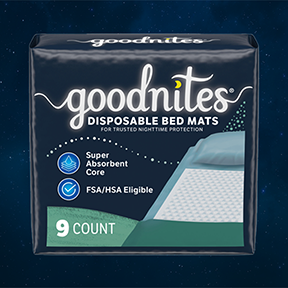What is Secondary Enuresis?
Secondary enuresis is when your child had a period of dry nights and now, they are starting to wet the bed again. Feelings of confusion and embarrassment can lead to feeling ashamed or losing confidence in their ability to sleep accident-free during the night.
While most kids naturally grow out of wetting the bed, some can develop secondary enuresis. This can happen even after they’ve been sleeping dry for six months or more.
Read on to learn more about secondary bedwetting to help your child resolve their bedwetting issues.
What is the Difference Between Primary vs. Secondary Enuresis?
Are you wondering what the difference is between primary and secondary enuresis? A child with primary enuresis has never stopped wetting the bed and a child with secondary enuresis stopped wetting the bed for at least 6 months and now is wetting the bed again. According to StatPearls, bedwetting will slowly resolve itself as your child ages. With 25% of four-year-olds experiencing regular bedwetting and only 4% of eight-year-olds experiencing it. If your child starts to wet the bed again, it can be stressful, and you should reach out to your medical for provider for any bedwetting concerns.What Causes Secondary Enuresis?
Secondary enuresis can be caused by a few factors.-
Medical Conditions
Bedwetting could be caused by some medical conditions, including:- Constipation
- Diabetes
- A UTI
- Hormonal imbalances
- Sleep apnea
Any one of these conditions or others could be playing a role in your child’s bedwetting. To be sure, discuss with your child’s medical provider. -
Psychological Stress and Life Changes
Going through big life changes can be stressful. If your child has recently experienced big life changes like moving to a new neighborhood, starting a new school, or a new baby entering the picture, being bullied, or a death in the family your child might be feeling the pressure of these changes. This can cause unexpected issues such as bedwetting.

How to Manage Secondary Enuresis
When it comes to managing your child’s enuresis, there are a few different treatment options you can follow. With the advice and diagnosis of your child’s medical provider, you and your family can find the best treatment option for your child.-
Behavioral Interventions
Using methods like fluid limiting, peeing before bedtime, or bladder therapy can be effective at helping manage enuresis.
- Limit fluids before bedtime. At least two hours before bedtime have your child stop drinking fluids. They should be kept well hydrated throughout the day but by lessening their fluid intake before bed you can help limit the amount of urine they create.
- Peeing before bedtime. This method works by helping your child empty out their bladder before going to sleep. Even if they sometimes don’t feel the urge to pee it’s a good idea to have them sit on the toilet to release any urine that needs to come out.
- Using bladder therapy. If your child is wetting the bed because their bladder is too small, then bladder training might be the answer for you. You do this by slowly increasing the amount of time your child waits before using the bathroom during the day. This could help grow their bladder, helping it to hold more pee.
-
Limit Caffeine and Carbonated Drinks
Stopping their intake of caffeinated or carbonated drinks may help. Caffeinated and carbonated drinks have been shown to irritate the bladder. -
Therapeutic Approaches
If you’ve tried the above methods and haven’t had any success it might be time to go the therapeutic route. This could include seeing a counselor or child therapist or using bedwetting alarms.- Using a bedwetting alarm. Bedwetting alarms work by detecting moisture/urine. There are different kinds of alarms, some of which are worn by your child and some of which go on their beds. Once the alarm feels wetness, it makes a loud noise that will wake your child up to go use the bathroom.
- Professional counselling. Your child might not feel comfortable talking to you about what they’re going through. A qualified therapist may help ease your child’s fears.
Lead with an Encouraging and Supportive Attitude
Although you might feel frustrated, letting your child know that you’re there for them is essential. Being supportive and loving can make all the difference. For added support, use Goodnites® XXL Bedwetting Underwear. Only Goodnites® Nighttime Underwear comes in five sizes to fit up to 165 lbs.
This content should not substitute medical advice from your personal healthcare provider. Please consult your healthcare provider for diagnosis or treatment.









